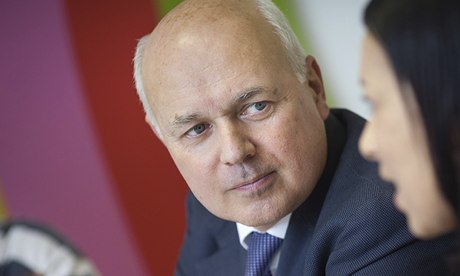Iain Duncan Smith's claim that problems will cost only £41m is down to 'a major change in accounting treatment', NAO says

Iain Duncan Smith has denied that the
universal credit timetable is slipping. Photograph: Wpa Pool/Getty
Images
The government's official
independent auditors have challenged claims by the work and pensions secretary,
Iain Duncan
Smith, that IT problems associated with that new universal credit scheme
have cost taxpayers only £41m.
The department said it had increased its initial write-off of its failed IT system for universal credit up to £41m. However, it said it was justifiable to declare a remaining £90m of IT software as being written down, rather than written off, because its value would be drawn down over a five-year period, by which time universal credit would have been introduced.
The NAO auditor general, Amyas Morse, said this represented "a major change in accounting treatment" and said £90m of assets were now having to be written down at a pace of £18m a year instead of the previous estimate of £6m a year.
The NAO also raises serious doubts about whether plans to introduce a new core digital software will work, or even ever grow to any size quickly.
Its report, published on Tuesday, says: "As the department develops the digital solution, so it will start to recognise some of the costs incurred as assets. Without clear and effective management, in the future the department may also find it needs to impair some of these new digital assets."
The NAO said the accounting treatment of the existing software assets used on the original technological design "should not detract from the underlying issue that the department has spent £91m on assets that will only support a limited service for five years, with clear consequences for public value".
Universal credit, which
brings together six existing benefits, is seen as
potentially the biggest change to welfare since the second
world war. Ministers had to concede last week that it had fallen behind schedule
and would not be completed by 2017 as originally planned.
The annual report has been delayed as accountants and ministers have wrangled on how to treat the loss of software assets due to the failure of some universal credit software to meet requirements, including for security.
The department's annual report also says: "The migration to a digital solution is expected to be broadly complete by December 2017. As the department will therefore continue to operate the existing universal credit IT infrastructure until 2017-18, it has determined that the £91m of assets now have a useful life of only five years and it intends to amortise this amount over that period."
In the Commons, Duncan Smith claimed the writing down procedure was quite normal likening it to the way in which a car depreciates in value.
The NAO report adds "The department has to date not achieved value for the money it has incurred in the development of universal credit, and to do so in future it will need to learn the lessons of past failures and:
• Properly commission and manage IT development.
• Exercise effective financial control over the universal credit programme.
• Set realistic expectations for the timescale for delivery.
Referring to the £90m additional writedown, the chair of the public accounts committee said: "Whilst these figures are truly shocking, I do not think we have heard the end of this matter and would not be surprised if further write-offs emerge over the coming period.
"It is deeply depressing that DWP has chosen to pour more money into the existing IT system in what seems like a short-term fix, rather than showing the confidence and foresight to come up with a solution that will truly stand the test of time.
"Even for those people who transfer to the new benefit, the online system is currently not able to deal with issues like frequent changes of circumstances, claims if a couple splits up, or conditionality."
Guardian